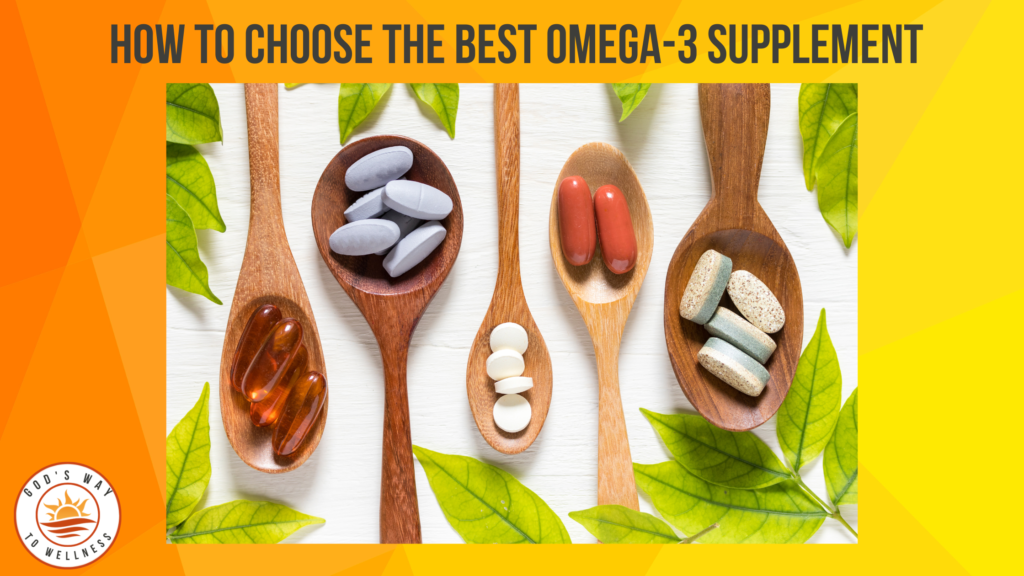Do you wander through the vitamins and supplements aisles in the drugstore or big box store wondering “what supplements should I take?” I know! There are so many choices.
Food made by God is the best source of the nutrients essential to the health of our bodies. But often we cannot get all our nutrients from food.
Over the next few weeks in the blog, discover recommendations for three must-have supplements from Dr. Rhonda Patrick, a cell biologist and co-founder of FoundMyFitness.
So, do you need a vitamin D supplement? Let’s dig in to find out more about vitamin D.
What is vitamin D?
Vitamin D is a fat-soluble vitamin that is converted to a steroid hormone in the kidneys. It is involved in turning on and off over 1000 different genes in the body. Vitamin D plays a crucial role in supporting the body’s immune system, bone strength, mental health, and cardiovascular well-being.
Foods rich in vitamin D
It is difficult to get enough vitamin D from our diet because few foods naturally contain it. High levels are in fatty fish such as salmon, tuna, sardines, and swordfish. Other less optimal sources include egg yolks, cheese, wild mushrooms, and beef liver. Products such as milk, orange juice, and cereals are fortified with vitamin D2, which is not as beneficial as vitamin D3.
| Food | IU/mcg per serving | % DV* |
|---|---|---|
| Cod liver oil, 1 tablespoon (15 ml) | 1,360 IU / 34 mcg | 227% |
| Salmon, cooked, 3 ounces (85 grams) | 570 IU / 14.2 mcg | 75% |
| Milk, 2% milkfat, vitamin D fortified, 1 cup | 120 IU / 2.9 mcg | 15% |
| Ready to eat cereal, fortified, 1 serving | 80 IU / 2 mcg | 10% |
| Sardines, 2, canned in oil | 46 IU / 1.2 mcg | 4% |
| 1 large whole egg (D is found in yolk) | 44 IU / 1 mcg | 7% |
| Beef liver, cooked, 3 ounces (85 grams) | 42 IU / 1 mcg | 7% |
| Tuna, canned in water, 3 ounces (85 grams) | 40 IU / 1 mcg | 26% |
| Reference |
Why are we deficient in vitamin D?
Why do at least 70% of people in the U.S. have inadequate or deficient vitamin D?
First, fortified foods provide most of the vitamin D in American diets. The amounts are low and the fortified vitamin D2 is not as effective as vitamin D3.
Second, we produce vitamin D in our skin when exposed to sunlight. However, our modern lives limit the time we are outside, and sunscreen also decreases the production of vitamin D in the skin.
Next, as we age, we produce less vitamin D in our skin. Also, dark-skinned individuals have greater amounts of melanin in the epidermal layer of the skin, which reduces the skin’s ability to produce vitamin D from sunlight.
Furthermore, obesity is a risk factor for low vitamin D because greater amounts of subcutaneous fat store more of the fat-soluble vitamin D.
Finally, certain medications, such as statins and steroids, affect vitamin D levels.
Am I getting enough vitamin D?
Unless you eat fatty fish every day or get 20 minutes of sun exposure daily without clothing or sunscreen and you are below the latitude of Atlanta in the summer, you are probably not getting enough vitamin D.
A widely available blood test will tell you if you are getting enough vitamin D. It is not part of a regular screening panel but ask your doctor to perform a 25-hydroxy vitamin D3 test.
Symptoms and diseases caused by low vitamin D levels
| Rickets and osteomalacia (soft bones and skeletal deformities) |
| Bone loss |
| Fatigue |
| Bone and back pain |
| Frequent illness and infections |
| Anxiety and depression |
| Impaired wound healing |
| Hair loss |
| Muscle pain |
| Reference |
|---|
Why should I take a vitamin D supplement?
Since the body relies on vitamin D for various functions, it is highly recommended to take a supplement to reduce the risk of many diseases.
Maintain optimal vitamin D levels to lower the risk of these diseases
| Osteoporosis |
| Cancer |
| Autoimmune diseases (such as multiple sclerosis) |
| High blood pressure and heart disease |
| Diabetes |
| Depression |
| Reference |
|---|
Details on supplements and dosage
The RDA (Recommended Dietary Allowance) for adults is 600 IU per day and 800 IU if you are >70 years old. However, this is not enough if you are deficient or inadequate.
The recommended levels of vitamin D in the blood are:
- Deficient: <= 20 ng/ml
- Inadequate: <30 ng/ml
- Adequate: <=30-60 ng/ml
Vitamin D3 supplements come in tablets and liquids. Each 1000 IU raises serum levels by approximately 5 ng/ml. Supplements containing D3 are preferable over D2.
Therapeutic levels for supplements should be 1000-4000 IU/day per Dr. Mark Hyman.
However, the tolerable upper intake for adults is 4000 IU/day. Seek medical supervision if you take high doses of vitamin D, as excessive levels can be toxic.
Conclusion
Vitamin D is a fat-soluble vitamin which regulates over 1000 different genes in the body. Taking a supplement is important for our wellness since we rarely get enough through our diets or sunlight exposure.
Consult your healthcare provider to get the 25 hydroxy vitamin D3 test done and coordinate on supplementation to minimize any potential medication interactions.
Are you ready to try a vitamin D supplement? Or do you already take one? Let us know in the comments.
Read the previous post on magnesium supplements here, and omega-3 supplements here.
The information on this Website is provided for educational purposes only and is not intended as a substitute for the advice provided by a healthcare professional. You should not use the information on this Website for diagnosing or treating a health problem or disease or prescribing any medication or other treatment. You should always speak with a healthcare professional before taking any medication or nutritional, herbal or homeopathic supplement, or adopting any treatment for a health problem. If you have or suspect that you have a medical problem, promptly contact a healthcare professional.



